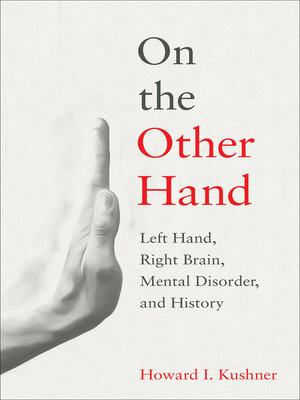
Sign up to save your library
With an OverDrive account, you can save your favorite libraries for at-a-glance information about availability. Find out more about OverDrive accounts.
Find this title in Libby, the library reading app by OverDrive.



Search for a digital library with this title
Title found at these libraries:
| Library Name | Distance |
|---|---|
| Loading... |
Does being left-handed make a person different in any way that matters?
Since the late Stone Age, approximately 10 percent of humans have been left-handed, yet for most of human history left-handedness has been stigmatized. In On the Other Hand, Howard I. Kushner traces the impact of left-handedness on human cognition, behavior, culture, and health.
A left-hander himself, Kushner has long been interested in the meanings associated with left-handedness, and ultimately with whether hand preference can even be defined in a significant way. As he explores the medical and cultural history of left-handedness, Kushner describes the associated taboos, rituals, and stigma from around the globe. The words "left" and "left hand" have negative connotations in all languages, and left-handers have even historically been viewed as disabled.
In this comprehensive history of left-handedness, Kushner asks why left-handedness exists. He examines the relationship—if any—between handedness, linguistics, and learning disabilities, reveals how toleration of left-handedness serves as a barometer of wider cultural toleration and permissiveness, and wonders why the reported number of left-handers is significantly lower in Asia and Africa than in the West. Written in a lively style that mixes personal biography with scholarly research, On the Other Hand tells a comprehensive story about the science, traditions, and prejudices surrounding left-handedness.







